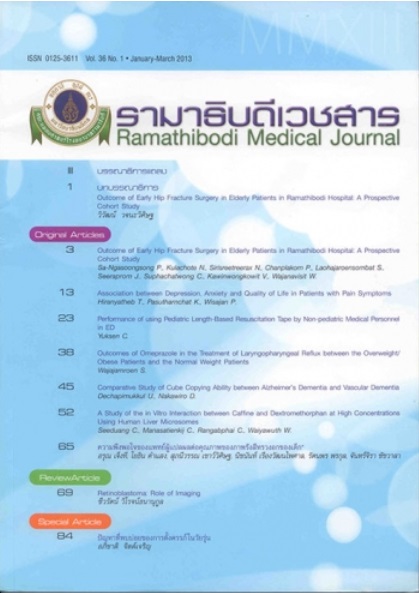Outcomes of Omeprazole in the Treatment of Laryngopharyngeal Reflux between the Overweight/Obese Patients and the Normal Weight Patients
Keywords:
Omeprazole, Reflux symptom index, Laryngopharyngeal reflux, ObesityAbstract
Objective: To compare the outcomes of omeprazole in the treatment of laryngopharyngeal reflux between the overweight/obese patients and the normal weight patients. Methods: A cross sectional analytical study of three-month omeprazole (20 mg b.i.d.) for patients with a reflux symptom index (RSI) 14 or more. RSU was accessed as baseline and after three months of treatment. The difference of total RSI score before and after treatment in the overweight/obese patients (body mass index; BMI 25-29.9 / >30 kg/m2) and the normal weight patients (BMI 18.5-24.9 kg/m2) was examined in independent t-test. Result: A total of 84 patients (23 men and 61 women, mean age 47.68 years; 42 overweight/obesity patients and 42 normal weight patients) were enrolled in this study. Baseline characteristics (age, sex, height) between the two groups were comparable. No statistically significant difference were noted for any baseline variables between two groups. The total RSI score before treatment between overweight/obesity patients and normal weight patient were not significant difference (mean total RSI 19.71References
Koufman JA. The otolaryngologic manifestations of gastroesophageal reflux disease (GERD): a clinical investigation of 225 patients using ambulatory 24-hour pH monitoring and an experimental investigation of the role of acid and pepsin in the development of laryngeal injury. Laryngoscope. 1991;101(4 Pt 2 Suppl 53):1-78.
Franco RA Jr. Laryngopharyngeal reflux. Allergy Asthma Proc. 2006;27(1):21-5.
Belafsky PC, Rees CJ. Laryngopharyngeal reflux: the value of otolaryngology examination. Curr Gastroenterol Rep. 2008;10(3):278-82.
Vaezi MF. Laryngeal manifestations of gastroesophageal reflux disease. Curr Gastroenterol Rep. 2008;10(3):271-7.
Hopkins C, Yousaf U, Pedersen M. Acid reflux treatment for hoarseness. Cochrane Database Syst Rev. 2005(3) Accession No. 0075320-10000000-03935.
Vakil N, van Zanten SV, Kahrilas P, Dent J, Jones R. The Montreal definition and classification of gastroesophageal reflux disease: a global evidence-based consensus. Am J Gastroenterol. 2006;101(8):1900-20.
Moayyedi P, Talley NJ. Gastro-oesophageal reflux disease. Lancet. 2006;367(9528):2086-100.
Davide Festi, Eleonora Scaioli, Fabio Baldi, et al. Body weight, lifestyle, dietary habits and gastroesophageal reflux disease. World J Gastroenterol. 2009;15(14):1690-701. doi:10.3748/wjg.15.1690.
Aekplakorn W, Mo-Suwan L. Prevalence of obesity in Thailand. Obes Rev. 2009;10(6):589-92. doi:10.1111/j.1467-789X.2009.00626.x.
Berardi RR. A critical evaluation of proton pump inhibitors in the treatment of gastroesophageal reflux disease. Am J Manag Care. 2000;6(9 Suppl):S491-505.
Ulualp SO, Toohill RJ, Shaker R. Outcomes of acid suppressive therapy in patients with posterior laryngitis. Otolaryngol Head Neck Surg. 2001;124(1):16-22.
Belafsky PC1, Postma GN, Koufman JA. Validity and reliability of the reflux symptom index (RSI). J Voice. 2002;16(2):274-7.
Ylitalo R, Lindestad PA, Ramel S. Symptoms, laryngeal findings, and 24-hour pH monitoring in patients with suspected gastroesophago-pharyngeal reflux. Laryngoscope. 2001;111(10):1735-41.
Ford CN. Evaluation and management of laryngopharyngeal reflux. JAMA. 2005;294(12):1534-40.
Park W, Hicks DM, Khandwala F, et al. Laryngopharyngeal reflux: prospective cohort study evaluating optimal dose of proton-pump inhibitor therapy and pretherapy predictors of response. Laryngoscope. 2005;115(7):1230-8.
Steward DL, Wilson KM, Kelly DH, et al. Proton pump inhibitor therapy for chronic laryngo-pharyngitis: a randomized placebo-control trial. Otolaryngol Head Neck Surg. 2004;131(4):342-50.
Lien HC1, Wang CC, Hsu JY, et al. Classical reflux symptoms, hiatus hernia and overweight independently predict pharyngeal acid exposure in patients with suspected reflux laryngitis. Aliment Pharmacol Ther. 2011;33(1):89-98. doi: 10.1111/j.1365-2036.2010.04502.x.
Pace F, Coudsy B, DeLemos B, et al. Does BMI affect the clinical efficacy of proton pump inhibitor therapy in GERD? The case for rabeprazole. Eur J Gastroenterol Hepatol. 2011;23(10):845-51. doi:10.1097/MEG.0b013e32834991b7.
Choi CW, Kim GH, Song CS, et al. Is obesity associated with gastropharyngeal reflux disease?. World J Gastroenterology. 2008;14(2):265-71. doi:10.3748/wjg.14.265.













